Chilmark fishermen Christopher Murphy approached medical anthropologist Nora Groce after her delivery of the last Nathan Mayhew Seminars lecture of the summer Thursday night, and recalled a remnant of sign language use by old-timers he used to work for.
The news came as pleasant confirmation to Miss Groce, who has spent the better part of the last six years tracing the origins of a community of deaf people who lived pretty much like - and in harmony with - the hearing populace of the Vineyard from its earliest settlement through the 19th century.
“It’s a model of another way human beings can adapt to a handicapped - rather, a disabling - condition,” Miss Groce said Thursday.” A disability isn’t a problem unless people make it a problem. What’s unique about the Vineyard is this adaptation to deafness.”
Not only the deaf people adapted, Miss Groce has concluded from her years of research, years which yielded a book that soon will be available in Island bookstores. The isolated Vineyard offered a haven of sorts for the descendants of a group of English settlers who came here in the mid-1700s and became, like the original Mayhews and Flanderses and Tiltons, founding families. Many of their hearing neighbors communicated comfortably with them in sign language. The difference is that these immigrants brought along an inherited strain of deafness that lasted several generations, Miss Groce said.
“What I was dealing with was a traveling gene pool,” Miss Groce said. She is not the first to follow this trail; an elocution professor from Boston first spotted a pattern of deafness in students at the American School for the Deaf in Hartford, Conn., and traced it to Vineyard ancestors. But the teacher wearied of the search, possessed of the Victorian conviction that the deafness must be snuffed out, starting with the nonverbal language of the afflicted and concluding with the prevention of procreation of deaf people.
Changing times were doing a lot of this preventive work for the eugenicists of the era. The years after the Civil War brought the first tide of summer people to the Island. Some settled here for good, marrying into the old families. Meanwhile, children of natives grew up to find dwindling opportunities in the traditional Vineyard vocations - fishing, whaling and farming - and began to look off-Island for their educations and their fortunes. This transfusion of people changed forever the human and occupational profile of the Vineyard, and with it, though gradually, the gene pool of deafness and the social pool of sign language that once flourished here.
By the late 1970s, the days of total communication were but a memory in the minds of a few aging Islanders when Nora Groce came to the Vineyard to record folk songs by Vineyard Haven historian Gale Huntington. On a ride around the Island, Mr. Huntington pointed out house after house where deaf mutes used to live. And Nora Groce wanted to know why.
Her early research led her to the story of Jonathan Lambert, the 17th-century settler for whom Lambert’s Cove is named. Mr. Lambert came here from Barnstable, and subsequently fathered two children who also were deaf. The trail seemed to grow cold there, since few records were kept between the early 1700s and 1850. It took an aging Tisbury woman to unwittingly put Nora Groce back on the trail. The woman wanted to know: “I wonder about all you folks coming in here asking me about the deafness.”
Were others asking the same question? Miss Groce asked.
No, the woman replied, but she remembered her mother telling her about some fellow from Boston asking a lot of questions about the deaf people, sometime in the 1880s.
So Mr. Huntington pointed Nora Groce to the back rooms of the Dukes County Historical Society, where she learned the name of the nosey elocution professor: Alexander Graham Bell, fresh from his invention of the telephone.
“This was his next project,” Miss Groce said. These were the days when deafness was though to have a single cause, and Mr. Bell figured by checking genealogies in the school in Hartford, he would find a pattern. New England communities kept the best and oldest records, and eventually he found it in the emigration from the Vineyard. He interviewed old-timers here and found “an oral tradition of about 130 years,” leading to the threshold of Jonathan Lambert’s day.
But Mr. Bell stopped there, having no knowledge of the monk Gregor Mendel, who was then formulating theories that would form the basis of modern genetics. He never published his findings, so it was by chance that a librarian found Bell’s notes on all those oral histories in a Virginia warehouse. They recealed that the Lambert family apparently was one of 10 that had been moving about since early in the 17th century. The forebears were followers of a minister named Lothrop, all of whom lived in an area of England’s Kent County called The Wheel. So far, Miss Groce has followed the trail there, but “their records only go back to the 1300s.”
So travel forward again with the Rev. Lothrop and his followers, boarding the ships Hercules and Griffin to sail to what is now Scituate, Mass. Thence to Barnstable, and lastly the Vineyard. Besides their gene pool, Miss Groce said, they carried with them from The Wheel a sophisticated sign language, some two centuries before educators of the deaf began systematically using manual communication in the United States. Here it thrived, and the people with it.
By the 19th century, the incidence of deafness on the Vineyard was one in 125 - compared with 1 in 5,700 nationwide, Miss Groce said. The greatest concentration was in Chilmark, where 1 in 25 residents were deaf. Indeed, in Squibnocket in the 1870s and ‘80s, one in four were deaf. So endemic were these people to the town, a virtual bilingual community existed.
“I hace descriptions of people teaching their toddlers signs,” Miss Groce said. The neighbors of the deaf communicated with them in sign, at the general store, the post office, and wherever citizens come together for social and political intercourse.
“On the Vineyard, all the deaf men were listed on the voter rolls, and several even held minor offices,” Miss Groce said. “Even today, I understand, people are elected to office whether they want to or not.”
Tax records of those time showed few poor deaf families, most getting by, and “one deaf man who was the richest person in the community.” The rich man had a deaf brother, but apparently did better because he was more frugal.
Conclusion?
“A handicap is socially defined,” Miss Groce said. “The main problem deaf people face today is not their ability to communicate but the hearing people’s ability to understand. What we consider a major handicap was not considered a handicap at all.
“The Vineyard tells us we have a lot more to learn.”

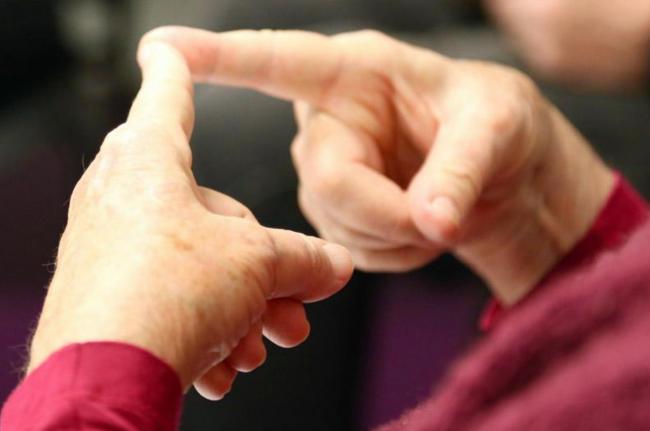
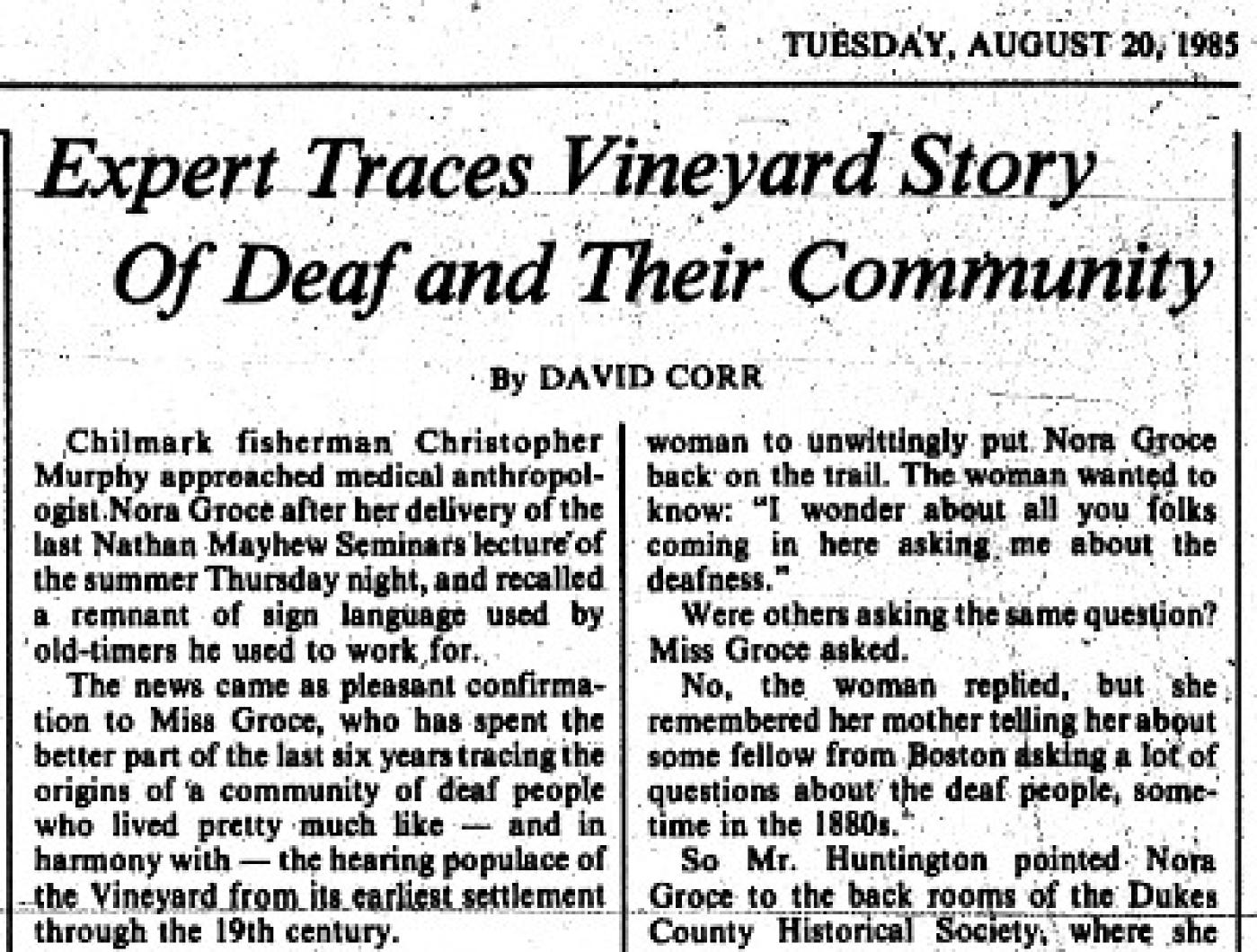


 1 comment
1 comment
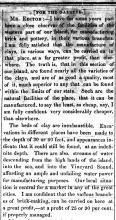

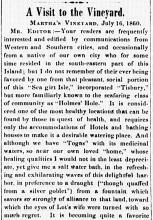
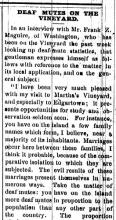
Comments (1)
Comments